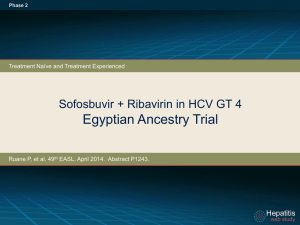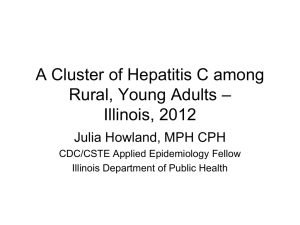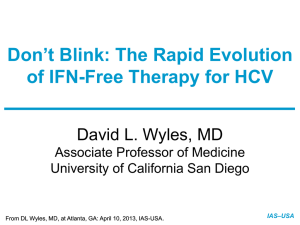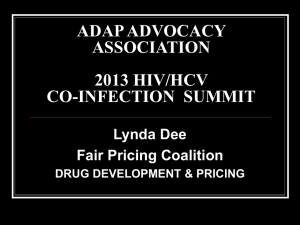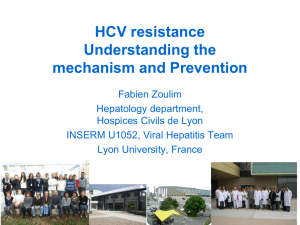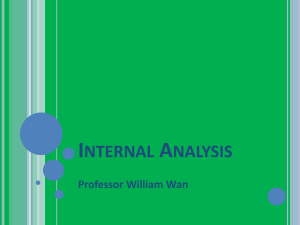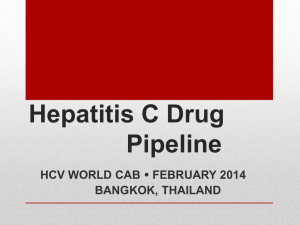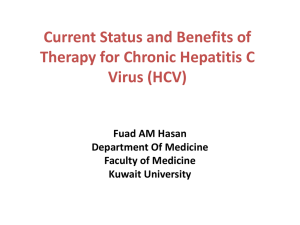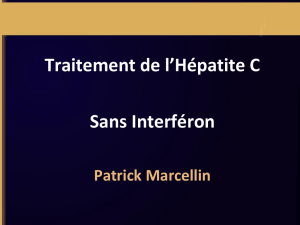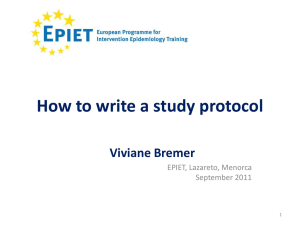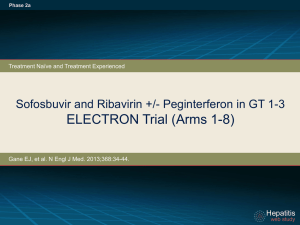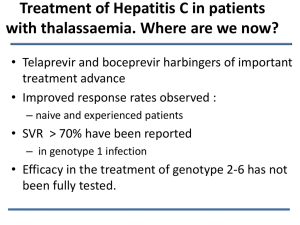Hepatitis C in 2014 - Middlesex Hospital
advertisement
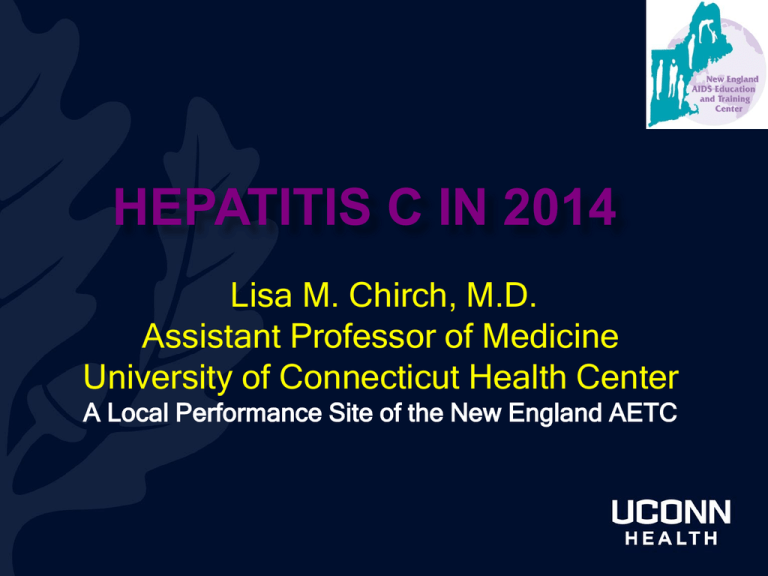
HEPATITIS C IN 2014 Lisa M. Chirch, M.D. Assistant Professor of Medicine University of Connecticut Health Center A Local Performance Site of the New England AETC Disclosures • None Objectives • • • Describe epidemiology, transmission, and clinical presentation of Hepatitis C infection Understand and implement new testing and screening recommendations Apply relevant data from recent publications regarding treatment of chronic hepatitis C infection Hepatitis C - Chapter 3 - 2012 Yellow Book | Travelers' Health | CDC wwwnc.cdc.gov Magnitude of the Problem • Nearly 4 million persons in United States infected • Approximately 35,000 new cases yearly • Acute infections on the rise since 2010 • <10% chronically infected patients are treated • Leading cause of Chronic liver disease Cirrhosis Liver cancer Liver transplantation http://www.cdc.gov/ncidod/diseases/hepatitis/c/fact.htm. “Silent Epidemic” NHANES survey: estimated unidentified HCV infections – 43% May 2011: U.S. Viral Hepatitis Action Plan Federal platform Educate providers and communities Increase awareness, testing and linkage to care USPSTF has aligned with CDC on testing recommendations – Grade B Ronald Valdiserri – DHHS Deputy Assistant Secretary; The Liver Meeting 2013 Hepatitis C, a Silent Killer, Meets Its Match November 4, 2013 Sources of Infection with HCV Indications for HCV screening? • HIV • IDU • History of chronic HD, transfusion, blood product or organ transplant prior to 1992 • Unexplained persistent elevation in ALT (?RNA) • and…. Hepatitis C: Screening guidelines • CDC 2012: • Recommendations for the Identification of Chronic Hepatitis C Virus Infection Among Persons Born During 1945–1965 • Recommendations and Reports, August 17, 2012 …one-time testing without prior ascertainment of HCV risk for persons born during 1945 -1965, a population with a disproportionately high prevalence of HCV infection and related disease. 2013: Update of Guidance for Clinicians and Laboratories • MMWR May 2013 • Availability of rapid test for HCV antibody (OraQuick) – Fingerstick or venipuncture – CLIA waiver by FDA in 2011 • Discontinuation of the RIBA HCV • Recommended testing sequence: MMWR May10, 2013 Question A 50 year old female with a history of HTN and DM is referred to you after her primary care physician performed hepatitis C antibody testing as part of routine evaluation, which was positive. She would like you to explain the chances that she does NOT have chronic hepatitis C infection. What do you tell her? A) 0% B) 15% C) 50% D) 75% E) 99% Answer A 50 year old female with a history of HTN and DM is referred to you after her primary care physician performed hepatitis C antibody testing as part of routine evaluation, which was positive. She would like you to explain the chances that she does NOT have chronic hepatitis C infection. What do you tell her? A) 0% B) 15% C) 50% D) 75% E) 99% Hepatitis C Virus Infection Natural History Acute HCV Resolved 15% (15%) Chronic HCV 85% (85%) Stable 80% (68%) HCC, hepatocellular carcinoma Cirrhosis 20% (17%) Slowly progressive 75% (13%) HCC Liver failure 25% (4%) Hepatitis C Virus Genotypes in the USA Type 2 17% Type 1 72% McHutchinson JG, et al. N Engl J Med. 1998;339:1485-1492. Type 3 10% All others 1% Management of Chronic HCV Disease Severity Response to Therapy AST/ALT Bilirubin Albumin Pro-time (INR) Platelet count Liver histology Transient Elastography ALT HCV RNA HCV genotype Liver histology IL28B IL28B:gene coding for IFN-λ3, associated with IFN sensitivity –C/C genotype (vs C/T or T/T) associated with favorable response to HCV treatment in pts treated with PEG/ribavirin Clark PJ, Am J Gastroenterol Oct 2010 HCV RNA and Liver Histology Fibrosis Serum HCV RNA does not correlate with level of fibrosis Log HCV RNA (copies/mL) 8 Genotype 1 2 3 4 6 4 2 0 No Portal Bridging Cirrhosis Fibrosis Fibrosis Fibrosis Ferreira-Gonzalez A, et al. Semin Liver Dis. 2004;24:9-18. How to Stage Hepatitis C Virus Infection Liver Biopsy • Only test that can accurately assess – Severity of inflammation – Degree of fibrosis • Determines – Risk for developing cirrhosis in future – Need for therapy – Need for ongoing therapy when initial treatment has failed Sampling error of liver biopsy Serum Markers of Liver Fibrosis Fibroscan Validity of Fibroscan Versus Biopsy HCV Fibrosis Progression Effect of Alcohol Fibrosis Score 4.0 3.0 Alcohol intake > 50 g/day* < 50 g/day 2.0 1.0 0 < 10 11-20 21-30 31-40 Duration of Infection (Years) *50 g is equal to approximately 3.5 drinks Poynard T, et al. Lancet. 1997;349:825-832. > 40 Cumulative Probability of Fibrosis Progression (%) Fibrosis Progression in HCV Effect of Steatosis Cumulative Probability of Fibrosis According to Level of Steatosis 100 80 60 40 30% 0 18% 18% 20 2% 6% < 5% 4% 33% 7% 5%-10% 11%-30% > 30% Percentage of Steatosis at Initial Biopsy Fartoux L, et al. Hepatology. 2005;41:82-87. Year 4 Year 6 Chronic Hepatitis C Virus Extrahepatic Manifestations • Nonspecific antibodies • Essential mixed cryoglobulinemia • Glomerulonephritis • Porphyria cutanea tarda • Leukocytoclastic vasculitis • Mooren’s corneal ulcer • Non-Hodgkin’s lymphoma • Autoimmune thyroiditis • Diabetes mellitus • Sjögren’s syndrome HCV Treatment Goals Goals of treatment for chronic HCV Viral eradication (undetectable viral load) Delay progression of fibrosis Prevent decompensation, HCC, and death Best indicator of successful treatment is sustained virologic response (SVR) Sustained virologic response SVR: serum HCV RNA is undetectable based on a quantitative HCV RNA assay with lower limit of detection of 50 IU/mL or less at 24 weeks after treatment ends SVR 12: …12 weeks after treatment ends RVR EVR Sustained Virologic Response (%) Treatment of Chronic HCV Peginterferon and Ribavirin 100 80 60 PegIFN-2a/RBV PegIFN-2b/RBV 40 20 0 1 2-3 Genotype Fried MW, et al. N Eng J Med. 2002;347:975-982. Manns MP, et al. Lancet 2001;358:958-965. Interferon • Flu-like symptoms: fatigue, headache, myalgias • Dose-related myelosuppression – Reversible with dose reduction (cost?) – Use of G-CSF and erythropoietin • Depression: risk assessment prior to therapy initiation – 35-40% – Management with SSRIs and TCAs Time Course of TreatmentAssociated Psychiatric Adverse Effects Incidence/Severity 100 80 Depression 60 Fatigue 40 20 Influenza-like symptoms 0 0 1 2 3 4 Months Dan A, et al. J Hepatol. 2006;44:491-498. Constant A, et al. J Clin Psychiatry. 2005;66:1050-1057. Ribavirin Nucleoside analog Inhibits inosine monophosphate dehydrogenase Potentiates purine analogs, ie didanosine Immune modulator, shift from Th2 to Th1 response Teratogenic both men and women must use contraception during and for 6 months after treatment Dose-dependent hemolytic anemia Increased risk for lactic acidosis HCV Life Cycle and DAA Targets Receptor binding and endocytosis Transport and release Fusion and uncoating Translation and polyprotein processing NS3/4 protease inhibitors (+) RNA ER lumen LD LD Virion assembly LD Membranous web ER lumen NS5A* inhibitors *Block replication complex formation, assembly Adapted from Manns MP, et al. Nat Rev Drug Discov. 2007;6:991-1000. NS5B polymerase RNA replication inhibitors Nucleoside/nucleotide Nonnucleoside What Are the Key Elements of an Ideal HCV Regimen? Easy Dosing Once daily, low pill burden Highly Effective All Oral High efficacy in traditionally challenging populations (ie, poor IFN sensitivity, cirrhosis) PegIFN/RBV replaced with alternate backbone with low chance of resistance Simple Regimen Short duration, simple, straightforward stopping rules Pan-Genotypic Regimen can be used across all genotypes Safe and Tolerable Few or easily manageable adverse effects HCV Therapy: Past, Present and Future Suppression of HCV with DAA combination (PI + NI) Ribavirin Interferon 1990 Proof of concept for DAA (PI) 2000 2005 Pegylated interferons Telaprevir and boceprevir 2010 2011 IFN-free DAA combinations (GT1) Frequent curability of diverse populations without IFN 2012 Curability of HCV without interferon Potential approval of other DAAs with IFN 2013 2014 2015- Approval of simeprevir and sofosbuvir with IFN First approved IFN-free therapy: SOF + RBV for GT2/3 Telaprevir - PROVE 12-wk TVR + pegIFN/RBV (n = 17) 12-wk TVR + 24-wk pegIFN/RBV (n = 79) 12-wk TVR + 48-wk pegIFN/RBV (n = 79) Control (n = 75) 67‡ 100 Patients (%) 80 81* 81* 80 71 71 68 60 65 59* 57 61† 57 47 45 41 40 35 23 20 0 33 11 N/A Wk 4 2 6 N/A N/A Wk 12 Wk 24 Undetectable HCV RNA Wk 48 SVR N/A, not applicable. *P < .001 vs control. †P = .02 vs control. ‡P = .002 vs control. McHutchison JG, et al. N Engl J Med. 2009;360:1827-1838. Relapse Summary of Key Conclusions • 12-week course of TVR with 24 or 48 weeks of pegIFN/RBV increased SVR rates in treatmentnaive patients infected with genotype 1 HCV vs 48 weeks of pegIFN/RBV alone • TVR also resulted in higher rate of RVR and lower relapse rate compared with pegIFN/RBV • TVR increased rate of treatment discontinuation due to adverse effects, predominantly anemia, rash, rectal symptoms (FIARRHEA) • Small subset experienced virologic breakthrough with protease resistance mutations McHutchison JG, et al. N Engl J Med. 2009;360:1827-1838. No Free Lunch Treatment is more effective but much more difficult Jordan Feld, MD, MPH. Toronto Western Hospital Liver Centre Other Issues With PI-Based Therapy Pill burden Food requirement Resistance BOC = 12/day TVR = 6/day RBV = 4-7/day RBV = 4-7/day Drug-drug interactions PI CYP3A4 metabolites 20 grams of fat… • Breakfast Ideas – 2-egg omelet with 1 ounce shredded cheese; oatmeal with 1 ounce nuts and ½ tablespoon butter; toast with 2 tablespoons unsalted peanut butter and glass of 2% milk; bagel with 2 tablespoons cream cheese and glass of whole milk 1 egg and 1-3 sausage links (check sausage label, need 15 g fat) • Lunch / Dinner – 6 ounces salmon; ½ box prepared macaroni and cheese; 3 tablespoons of 2 cups of canned chili with meat; sandwich with 3 slices bologna; 1½ beef hot dogs; 1 chicken leg and thigh with skin; burrito with beans, cheese, and guacamole; 2 pork chops; french fries, medium order; quarter-pound hamburger or double cheeseburger Drug–Drug Interactions a Clinical Challenge With Current Therapy Several drugs contraindicated; many more require dose adjustment or caution Drug Class Contraindicated With BOC[1] Contraindicated With TVR[2] Alpha 1-adrenoreceptor antagonist Alfuzosin Alfuzosin Anticonvulsants Carbamazepine, phenobarbital, phenytoin N/A Antimycobacterials Rifampin Rifampin Ergot derivatives Dihydroergotamine, ergonovine, ergotamine, methylergonovine Dihydroergotamine, ergonovine, ergotamine, methylergonovine GI motility agents Cisapride Cisapride Herbal products Hypericum perforatum (St John’s wort) Hypericum perforatum HMG CoA reductase inhibitors Lovastatin, simvastatin Lovastatin, simvastatin Oral contraceptives Drospirenone N/A Neuroleptic Pimozide Pimozide PDE5 inhibitor Sildenafil or tadalafil when used for tx of pulmonary arterial hypertension Sildenafil or tadalafil when used for tx of pulmonary arterial hypertension Sedatives/hypnotics Triazolam; orally administered midazolam Orally administered midazolam, triazolam 1Boceprevir [package insert]. November 2012. 2. Telaprevir [package insert]. October 2012. Limited Efficacy With Telaprevir and Boceprevir in Some Patient Groups 100 75-83[1,2] SVR (%) 80 68-75[3,4] 42-62[3,4] 53-62[3,4] 60 40-59[1,2] 29-40[1,5] 40 20 0 14[6]* Relapser Naive White/ Nonblack Naive Naive Black Partial Cirrhotic Responder Null Responder Cirrhotic Null Responder *Pooled TVR arms of REALIZE trial. 1. Zeuzem S, et al. N Engl J Med. 2011;364:2417-2428. 2. Bacon BR, et al. N Engl J Med. 2011;364:1207-1217. 3. Jacobson IM, et al. N Engl J Med. 2011;364:2405-2416. 4. Poordad F, et al. N Engl J Med. 2011;364:1195-1206. 5. Bronowicki J, et al. EASL 2012. Abstract 11. 6. Zeuzem S, et al. EASL 2011. Abstract 5. Question A 44 year old male with a history of prior heroin abuse (clean for 1 year +) is referred for hepatitis C therapy. His HCV RNA level is 5.2 million IU/mL, genotype 1b, ALT 65, and there are no stigmata or lab values to suggest ESLD. He does have a history of depression and anxiety, requiring mirtazapine and citalopram therapy. How should you proceed? A) get a liver biopsy – this will help me decide B) He cannot receive therapy due to comorbidities C) Treat with just IFN/ribavirin, he will not likely tolerate a PI D) Treat with just telaprevir, he will not likely tolerate IFN E) wait for something better Answer A 44 year old male with a history of prior heroin abuse (clean for 1 year +) is referred for hepatitis C therapy. His HCV RNA level is 5.2 million IU/mL, genotype 1b, ALT 65, and there are no stigmata or lab values to suggest ESLD. He does have a history of depression and anxiety, requiring mirtazapine and citalopram therapy. How should you proceed? A) get a liver biopsy – this will help me decide B) He cannot receive therapy due to comorbidities C) Treat with just IFN/ribavirin, he will not likely tolerate a PI D) Treat with just telaprevir, he will not likely tolerate IFN E) wait for something better Standard of Care of Chronic HCV Infection- October 2014 Genotype Regimen Duration Considerations 1 Sofosbuvir + Ledipasvir (FDC) 12 weeks (24 for experienced cirrhotics) FDA approved, not yet in guidance 1 Sofosbuvir + IFN/RBV 12 weeks Minimal drug interactions 1 Sofosbuvir + Simeprevir +/RBV 12 weeks Off label to date For IFN ineligible 2 Sofosbuvir + RBV 12 weeks 3 Sofosbuvir + RBV 24 weeks www.hcvguidelines.org NEUTRINO: SVR12 With Sofosbuvir + P/R According to Genotype and Fibrosis Level SVR12 According to Fibrosis Level SVR12 According to Genotype 100 89 96 100 100 80 80 SVR12 (%) 80 SVR12 (%) 92 60 40 20 60 40 20 n/N = 261/292 27/28 7/7 252/273 43/54 No Cirrhosis Cirrhosis 0 0 GT 1 GT 4 GT 5,6 Lawitz E, et al. EASL 2013. Abstract 1411. N Engl J Med 2013; 368:1878-1887 COSMOS: SVR12 in Cohorts 1 and 2 by HCV Subgenotype and Baseline Q80K SVR12 (%) GT1a without Q80K GT1b GT1a with Q80K Cohort 1 (F0-F2 Nulls)*[1] 100 100 100100 100 100 100 Cohort 2 (F3-F4 Naives/Nulls)*[2] 100 100 100 100 100 100 100 100 100 100 100 89 89 89 100 100 93 100 100 95 96 88 88 83 80 60 40 20 4/ 7/ 8/ 4 7 9 3/ 7/ 3/ 3 7 3 6/ 12/ 8/ 6 12 9 4/ 4/ 5/ 4 4 6 7/ 30/ 24/ 17 30 27 6/ 11/ 11/ 6 11 11 4/ 7/ 4/ 4 7 4 5/ 13/ 7/ 5 14 8 3/ 7/ 3/ 3 8 3 18/ 38/ 25/ 18 40 26 SMV/SOF + RBV SMV/SOF SMV/SOF+ RBV SMV/SOF SMV/SOF ± RBV SMV/SOF + RBV SMV/SOF SMV/SOF + RBV SMV/SOF SMV/SOF ± RBV 0 24 Wks 12 Wks Overall 24 Wks 12 Wks *Excluding patients who discontinued for nonvirologic reasons. 1. Sulkowski M, et al. EASL 2014. Abstract O7. 2. Lawitz E, et al. EASL 2014. Abstract O165. Overall TURQUOISE II: SVR12 With 3 DAAs + RBV in Cirrhotic Pts by HCV Subtype GT1a SVR12 (%) 100 93.3100 100 100 92.9 80.0 80 80 60 60 40 40 20 20 0 92.2 92.9 12 wks 24 wks 100 59/ 52/ 64 56 Naive 14/ 13/ 15 13 11/ 10/ 11 10 40/ 39/ 50 42 Relapse Partial Null Response Response 0 GT1b 100 100 100 100 85.7100 100 100 22/ 18/ 22 18 25/ 20/ 25 20 6/7 3/3 14/ 10/ 14 10 Naive Relapse Partial Null Response Response Virologic failure in 17/380 pts (4.5%); relapse more frequent with 12-wk vs 24-wk treatment (12 vs 1 pt), 7/12 relapsers by posttreatment Wk 12 were GT1a null responders Poordad F, et al. EASL 2014. Abstract O163 Summary of Investigational HCV Agents Class Drug Dosing ABT-450/RTV 150/100 mg NS3 protease inhibitor Asunaprevir 200 mg BID NS3/4A protease inhibitor Faldaprevir 120 mg or 240 mg QD NS3 protease inhibitor GS-9451 200 mg QD NS3/4A protease inhibitor MK-5172 100 mg QD NS3/4A protease inhibitor Simeprevir* 150 mg QD NS5B nonnucleoside polymerase inhibitor ABT-333 400 mg BID NS5B nonnucleoside polymerase inhibitor BMS-791325 75 mg or 150 mg BID NS5B nonnucleoside polymerase inhibitor Deleobuvir 600 mg BID NS5B nonnucleoside polymerase inhibitor GS-9669 500 mg QD Sofosbuvir* 400 mg QD NS5A inhibitor ABT-267 25 mg QD NS5A inhibitor Daclatasvir 30 mg BID or 60 mg QD NS5A inhibitor Ledipasvir** 90 mg QD NS5A inhibitor MK-8742 20 or 50 mg QD NS5A inhibitor PI-688 200 mg QD NS3/4A protease inhibitor NS5B nucleotide polymerase inhibitor *FDA approved December 2013; **October 2014 Regimen Genotype Mechanism of Action Approximate SVR in naïve/relapsers Daclatasvir + Sofosbuvir +/- RBV 1,2,3 NS5A/NS5B polymerase 98/92/89% ION-1,2,3: Sofosbuvir + Ledipasvir (FDC) +/- RBV 1, naïve and previously treated Polymerase / NS5A 97-99% Sof/LDV + RBV or GS 9669 1 Polymerase / NS5A inhibitor + non-nuc. 100/100% SAPPHIRE-I and –II: ABT-450/RTV + ombitasvir + Dasabuvir + RBV 1 Protease/NS5A/NS5B polymerase/ritonavir >95% 1, cirrhosis Protease/NS5A/NS5B polymerase/ritonavir 92-96% 1 2nd gen protease, NS5A 90-100 N Engl J Med. 2014 Apr 11. N Engl J Med 2014;370:17. TURQUOISE-II: ABT-450/RTV + ombitasvir + Dasabuvir + RBV N Engl J Med. 2014 Apr 11. [Epub ahead of print] C-WORTHY: MK-5172/MK-8742 +/RBV • Enter the Nonspecialist: – Will Evolving Hepatitis C Therapies Reduce the Need for Specialized Care? – Graham R. Foster, FRCP, PhD - 10/8/2013 “A rapid expansion of patients and providers will mirror improving efficacies and gentler adverse event profiles…the introduction of a single-tablet regimen for HCV therapy—a development that will propel hepatitis C care to its future in nonspecialist providers offices. Information will be the key to overcoming preconceptions about adverse events and regimen complexities, finally allowing nonspecialists to take a central role in caring for HCV-infected patients”. Parting thoughts The last word… “Back to the Future”…? The future is here. Liang and Ghany “The Costs of Success” Hoofnagle and Sherker Connecticut Infectious Diseases Society Annual Meeting, New Haven, CT. May 15, 2014
